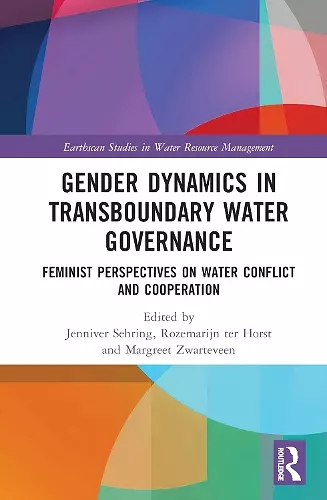Gender Dynamics in Transboundary Water Governance
Feminist Perspectives on Water Conflict and Cooperation
Margreet Zwarteveen editor Jenniver Sehring editor Rozemarijn ter Horst editor
Format:Hardback
Publisher:Taylor & Francis Ltd
Published:29th Jul '22
Currently unavailable, and unfortunately no date known when it will be back
This hardback is available in another edition too:
- Paperback£41.99(9781032057323)

This volume assesses the nexus of gender and transboundary water governance, containing empirical case studies, discourse analyses, practitioners’ accounts, and theoretical reflections.
Transboundary water governance exists at the intersection of two highly masculinised fields: diplomacy and water resources management. In both fields, positions are mainly held by men, and core ideas, norms, and guiding principles that are presented as neutral, are both shaped by men and based on male experiences. This book sheds light on the often hidden gender dynamics of water conflict and cooperation at the transboundary level and on the implicit assumptions that guide research and policies. The individual chapters of the book, based on case studies from around the world, reveal the gendered nature of water diplomacy, take stock of the number of women involved in organisations that govern shared waters, and analyse programmes that have been set up to promote women in water diplomacy and the obstacles that they face. They explore and contest leading narratives and knowledge that have been shaped mainly by privileged men, and assess how the participation of women concretely impacts the practices, routines, and processes of water negotiations.
This volume will be of great interest to students and scholars of water governance, water diplomacy, gender, international relations and environmental politics. It will also be of interest to professionals and policymakers involved in supporting gender mainstreaming in water cooperation.
The Open Access version of this book, available at www.taylorfrancis.com, has been made available under a Creative Commons Attribution-Non Commercial-No Derivatives 4.0 license.
"In this seminal collection, the authors expose the inherent genderedness of business-as-usual transboundary water management and provide readers with tools and experience to unravel and dismantle implicit and explicit bias at various scales. While focusing on gender, their work is equally relevant to cultural, racial, and inter-generational examinations. The authors voice the need for active mitigation of institutional bias and a critical re-thinking of decision-making processes and priorities. With this important new release, the authors make visible the untenable cost of the status quo and the urgent need to course correct to meet the water and environmental crisis of today for all of society."
Elizabeth A. Koch, Operations Lead, Transboundary Water Cooperation, Stockholm International Water Institute (SIWI)
"This book provides a unique account of what "gender mainstreaming" means in transboundary water resources governance, from conceptual understanding to real life experiences. The comparative case studies across basins and basin organisations uncover critical narratives on participation in formal institutions and transboundary governance processes from a gender perspective, drawing attention to issues of inclusion, participation, and intersectionality. The depth of the case studies portrays uncontested responsibilities of duty bearers, being confronted with the lived experiences of women in society, and provides examples of transformational approaches to engender transboundary water management. Its conclusions on gender and feminism concretely summarize the contemporary state of knowledge and provide a well guided, forward-looking perspective on what and how inclusion can and should be in transboundary water governance."
Donald Kasongi, Secretary General, Nile Basin Discourse
"This book uses a feminist gaze to pry open the masculinist terrain of transboundary water governance. It skillfully unravels how water diplomacy and management professions come to be gendered. It also questions the persistence of state-centric and technical framings in transboundary water governance agendas that exclude other knowledges. Finally, the book is self-reflective and respects the situated knowledges of its contributors, thus amplifying a truly inclusive feminist ethos. I recommend this book not only to water professionals but also to aligned political ecologists who may be pondering on the positioning of feminist contributions to social justice in transboundary waters."
Bernadette P. Resurrección, Associate Professor and Queen’s National Scholar on Development in Practice, Global Development Studies, Queen’s University, Kingston, Ontario, Canada"As noted in the introduction to this wide ranging and nuanced volume, representatives of the interests in water diplomacy have historically been both overwhelmingly male and technical in their backgrounds and outlooks. Fortunately, that imbalance is slowly changing. Not only are women increasingly representing water constituents in dialogue at all scales, but the frameworks that are used to inform policy are moving well beyond the historical "deification of quantification" to include alternative, critical, affective, spiritual and, yes, feminist approaches – what the editors and authors refer to as the "gendering" of the field. The editors, all cutting edge "pracademics" in their own rights whose worldviews are deeply informed by their professional experiences as well as their academic frameworks, bring together a rich set of authors whose compelling case studies from around the world and thoughtful assessments weave a collective narrative of much needed global change, as well as the far-reaching implications that result."
Aaron Wolf, Professor of Geography, College of Earth, Ocean, and Atmospheric Sciences, Oregon State University, USA
ISBN: 9781032057309
Dimensions: unknown
Weight: 453g
210 pages